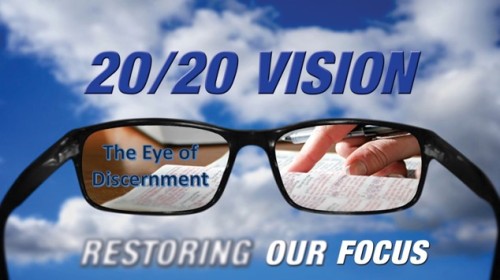The Eye of Discernment
Ron Thomas tells a story about an elderly woman who stood on a very busy street corner in rush hour traffic. She was fearful, confused, and hesitant to cross by herself.
Finally, a gentleman came up to her and asked if he could cross the street with her. Grateful and very relieved, she took his arm and stepped into the busy intersection. As they proceeded, she grew progressively alarmed as he zigzagged randomly across the street, to the blare of horns and screech of locked brakes.
Finally, after reaching their destination, she turned to the man and complained, “You almost got us killed! You walk like you’re blind.”
“I am,” he replied. “That’s why I asked if I could cross with you.”
Life is full of choices. Discernment is required for making good decisions. Obviously, this lady made a poor choice. The very one who she thought would provide her safety and security, was in desperate need for guidance himself. It reminds us of Jesus’ observation: “If the blind leads the blind, both will fall into a ditch” (Matt 15:14).
As we continue our theme this year, “20/20 Vision: Restoring Our Focus,” it’s imperative that we develop discernment. Spiritual discernment.
This was Paul’s prayer for the Philippian brethren.
“And this I pray, that your love may abound still more and more in knowledge and all discernment, that you may approve the things that are excellent, that you may be sincere and without offense till the day of Christ, being filled with the fruits of righteousness which are by Jesus Christ, to the glory and praise of God.” (Phil 1:9-10)
The English word translated “discernment” is from a Greek word that Thayer describes as “perception, not only by the senses but also by the intellect.” A. T. Robertson defines it as “delicate spiritual perception.”
It is the judicious ability to see with our spiritual eyes. It is an enlightenment that Hendricken says is “born of experience.” He further observes that it “is the ability of mind and heart to separate not only the good from the bad but also the important from the unimportant.”
Joseph M. Stowell, in Fan the Flame, writes that “Discernment in Scripture is the skill that enables us to differentiate. It is the ability to see issues clearly. We desperately need to cultivate this spiritual skill that will enable us to know right from wrong. We must be prepared to distinguish light from darkness, truth from error, best from better, righteousness from unrighteousness, purity from defilement, and principles from pragmatics.”
This text reminds us that love is not enough. Our love, while well-intentioned might be blinded by our lack of knowledge, insight, and perceptiveness. People can fool us. Emotions can deceive us. Situations are not always what they appear to be. Discernment is necessary to see below the surface.
In fact, even knowledge by itself without spiritual discernment will leave us short-sighted. It’s possible to intellectually understand God’s Word, but fail to see how it applies in our lives. How it regulates relationships. Guides the home. Directs our decisions in the workplace. And provides principles that aid us in our day to day choices.
Furthermore, knowledge is learning what God has said and done, but discernment is understanding why God said it or did it.
The Bible says that God “made known His ways to Moses, His acts to the children of Israel (Ps 103:7). The people got to see what God did, but Moses was able to understand why. Discernment offers deeper insight and aids in answering the “why” questions of life.
Discernment is vitally important because we live “in the midst of a
crooked and perverse generation.” Because “Satan himself is transformed
into an angel of light” our culture, like Isaiah described the ancient
world, calls “ evil good, and good evil; Who put darkness for light, and
light for darkness;
Who put bitter for sweet, and sweet for bitter! (Isa. 5:20).
The redefinition of marriage. Abortion on demand. Gender identify confusion. Animal rights activists. Extreme environmentalism. Sexual perversion. The rejection of moral absolutes. And add to all of this the confusion caused by Cultist religions and corrupt Christianity. No wonder people have lost their way in the confusing maze and moral mess in which we live. More than ever an eye of discernment is required.
The English writer and lexicographer, Samuel Johnson, was right when he wrote, “The supreme end of education is expert discernment in all things–the power to tell the good from the bad, the genuine from the counterfeit, and to prefer the good and the genuine to the bad and the counterfeit.”
–Ken Weliever, The Preacherman

